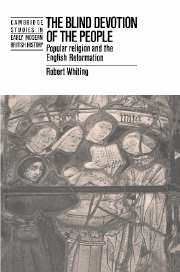Book contents
- Frontmatter
- Contents
- List of illustrations
- Preface
- Note
- 1 Introduction
- 2 Survey
- PART ONE ASSESSMENT
- PART TWO EXPLANATION
- 8 Spiritual motivations: Lutheranism, Calvinism and other faiths
- 9 Non-spiritual motivations: politics, economics and other forces
- 10 Mediate influences: literature, drama and art
- 11 Immediate influences: example, action and oral communication
- 12 Summation of Part Two
- 13 Perspective
- Appendix 1 Maps
- Appendix 2 Graphs
- Bibliography and abbreviations
- Index
8 - Spiritual motivations: Lutheranism, Calvinism and other faiths
Published online by Cambridge University Press: 11 December 2009
- Frontmatter
- Contents
- List of illustrations
- Preface
- Note
- 1 Introduction
- 2 Survey
- PART ONE ASSESSMENT
- PART TWO EXPLANATION
- 8 Spiritual motivations: Lutheranism, Calvinism and other faiths
- 9 Non-spiritual motivations: politics, economics and other forces
- 10 Mediate influences: literature, drama and art
- 11 Immediate influences: example, action and oral communication
- 12 Summation of Part Two
- 13 Perspective
- Appendix 1 Maps
- Appendix 2 Graphs
- Bibliography and abbreviations
- Index
Summary
That the period 1530–70 witnessed a devastating erosion of popular Catholicism would seem to be established beyond reasonable doubt. Yet the causal factors behind this phenomenon remain far from self-evident. With what justification may it be attributed to an upsurge of enthusiasm for an alternative brand of Christianity?
The verbal evidence unquestionably indicates that, in a number of cases, abandonment of traditional Catholicism was the result of positive conversion to Protestant beliefs. The most crucial of these beliefs concerned the location of religious authority and the means of human salvation. The former was held by Protestants to reside ultimately in the Bible rather than in the institutional Church. The latter they asserted to be solely by faith in the atoning work of Christ, and not by meritorious actions, participation in sacraments, or the intercession of saints.
The distinctively Protestant attitude towards the Bible was expressed with particular vigour by Philip Nichols of Totnes in the years 1547–9. Not only did this young layman study it personally in his native tongue – ‘I follow the English translators’, he records, ‘whose learning I cannot correct’ – he in fact revered it as the living voice of God himself. ‘Being read unto the people’, he believed, ‘to instruction and edifying of the congregation, [it] is the word of God; yea, Christ, the bread of life, which came from Heaven, so that who so eateth thereof shall live ever.’
- Type
- Chapter
- Information
- The Blind Devotion of the PeoplePopular Religion and the English Reformation, pp. 151 - 171Publisher: Cambridge University PressPrint publication year: 1989



